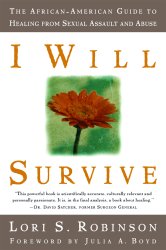
Lori S. Robinson, Author of "I Will Survive: An African-American Guide to Healing from Sexual Assault and Abuse," has worked at Peace Corps Headquarters' Communication Department in Washington, DC.
I Will Survive: An African-American Guide to Healing From Sexual Assault and Abuse
by Lori S. Robinson
“We have suffered in silence too long,” Lori Robinson states in the first paragraph of I Will Survive: An African-American Guide to Healing from Sexual Assault and Abuse.
What follows in this long-overdue book is a clear and concise description of the terrain that confronts victims as well as their families and friends. Robinson writes to and for African-Americans in a way that includes all survivors — men and women — of all ethnicities.
As a survivor, I found something enlightening and comforting in every chapter. Her detailed description of the post-assault medical exam — a truly anxious procedure — is framed as “a brave first step” in healing.
She dissects the legal process, specifically addressing the sexism, classism, and racism that effect all victims, with sound advice on navigating through a “grueling, flawed process in an effort to seek justice and protection for yourself and your community.” A process, she admits, that generally disrupts the “natural healing curve.”
Robinson’s discussion on the emotional impact of sexual assault and abuse includes initial feelings and behaviors, PTSD, secondary trauma, the range of therapies and what you can do on your own — with the goal, always, toward what she calls “authentic healing” as distinguished from short-term coping.
A remarkable chapter takes on the spiritual side of recovery, with prayers for Christians, Muslims, Bahai’i, Hebrew, and others. She even provides a timely and moving Prayer of Confession for congregations seeking forgiveness for ignoring the problem of sexual abuse and intimate violence:
“We are sorry for the times that we have been more worried about protecting the image / of ‘our’ community, than about the need to investigate and stop the sexual violence that occurs here.”
Robinson speaks squarely to the larger group of readers who have not been victimized directly. Every parent should read her chapter on risk reduction. In “Responding to Oppression,” she convincingly shows how sexism and racism are linked. Sexism is especially insidious in the way it “breaks down the camaraderie that we need to pull together” to prevent rape.
“Though sexual violence is ingrained in American culture,” she writes, “it doesn’t have to stay that way.” She offers an especially heartening example of how the “bus-stop” rapes in Chicago were stopped by the women and men of the Black community.
For journalists who cover violence this book provides especially clear, thorough and accurate information. Her statement that African-American women are raped at a higher rate than White women, for example, is backed up by three citations.
Yet her thorough sourcing in no way interrupts the flow of the book, whether she is exploding myths, supporting victims, encouraging changes in law, or telling her own or other survivor stories. Her advice in Chapter 4, directed to family and friends, offers helpful wording for reporters who interview victims of crime.
With the hopeful spirit embodied in the title, I Will Survive, Lori Robinson may well have written the most comprehensive, inclusive, and accessible book yet on the aftermath of sexual assault and abuse.
